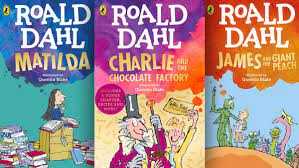
News that much loved children’s books, written by British novelist Roald Dahl are being rewritten to remove language deemed offensive, have been met with scathing criticism and ridicule. Publisher Puffin Books, hired sensitivity readers to rewrite chunks of the author’s text to ensure that, in their own words: “they can continue to be enjoyed by all today.”
Extensive changes across more than half of his 19 books, has seen hundreds of alterations to the original text. Additionally, and to the outrage of many of his fans, some passages not even written by the author who died in 1990, have been added to several of his classics. These concentrate on using gender neutral terms, and kinder descriptions of characters’ appearances, as well as removing what has controversially been interpreted by some, as being inappropriate language.
Puffin Books, a division of Penguin Random House, and the Roald Dahl Story Company, have worked in conjunction with Inclusive Minds, who are a group who say they are “passionate about inclusion and accessibility in children’s literature”. They have been reviewing the best-sellers such as: Charlie and the Chocolate Factory; James and the Giant Peach; The Witches; The BFG; The Fabulous Mr Fox; and Matilda, since 2020, and as far as they are concerned, the changes are in children’s best interests.
Prominent literary figures including the likes of Salman Rushdie and even UK prime minister Rishi Sunak, have called the editing ridiculously absurd, and totally unnecessary censorship; pointing out that any revisions made simply to suit 21st century “sensibilities”, risk undermining artistic genius and preventing the reader from confronting the issues of the world.
Cultural sensitivity
These changes are just the next in a line of efforts being made by campaigners who are concerned about cultural sensitivity, with their aim being to protect young people from cultural, ethnic and gender stereotypes in literature, and other media platforms. According to those making the amendments, they are “carefully considered” alterations, which basically involve cutting out, or re-writing references to five key areas: weight, mental health, violence, gender, and race.
Reviewing older books “nothing unusual”
The Roald Dahl Story Company, which controls the copyrights and trademarks to his books, said it worked alongside Puffin Books to review the content, which was not an unusual thing to do during a new print run of any books written years ago, they insisted.
They said it was accepted practice, just as it is to update book covers and page layout. Spokesperson Rick Behari said the company’s guiding principle throughout had been to “maintain the storylines, characters, and the sharp-edged spirit” of the original text. He added: “We want to ensure that Roald Dahl’s wonderful stories continue to be enjoyed by all children today.”
Inclusivity the aim of the group
The co-founder of Inclusive Minds, Alexandra Strick, remarked that their aim was to “ensure authentic representation”, by working closely with the book world and with those who have “lived experience of any facet of diversity.”
The aim of the organisation is to champion diversity and accessibility in children’s literature. Mr Strick declined to discuss the Dahl project specifically, but did admit that the group had helped to provide valuable input with regards to “reviewing language that can be damaging and perpetuate harmful stereotypes,” but added that they did not “write, edit or rewrite” any of the text.
Examples of some of the changes
In the list of changes some could, at a push, be regarded as justified, but the majority are ludicrous and show a lack of understanding of the children they are supposedly trying to protect.
In new editions, gone are any references to the words “fat” and “ugly” when describing character appearances, for example Augustus Gloop in Charlie and the Chocolate Factory is now described as “enormous”, whilst in The Twits, Mrs Twit is no longer “ugly and beastly” but just “beastly”. In the same book, “a weird African language” is no longer weird.
In James and the Giant Peach, Aunt Sponge was “terrifically fat” and “tremendously flabby” and Aunt Spiker was “thin as a wire” and “dry as a bone”. Both of these lines have been removed.
Any mention of “female” characters have also disappeared. Miss Trunchbull in Matilda, was a “most formidable female”, but is is now referred to as a “most formidable woman”. In a separate passage a threat to “knock her flat” has become “give her a right talking to”.
Similarly, changes have also been made when describing groups of people, with the removal of the term “men” to be replaced with more gender-neutral and inclusive language. The Oompa Loompas in Charlie and the Chocolate Factory are now “small people” instead of “small men”, and the “Cloud-Men” in James and the Giant Peach are now “Cloud-People”.
Colours also have been changed. The BFG’s coat is no longer black; while Mary in the same book goes “still as a statue” rather than “white as a sheet”. The word “black” has also been removed from the description of the terrible tractors in The Fabulous Mr. Fox, with the machines now simply referred to as “murderous, brutal-looking monsters”.
Biographer slams changes
The man who wrote a biography of Dahl, Matthew Dennison, said that in researching the author he identified that he had “fractious relationships with his editors” and disliked anyone tampering with his work. Mr. Dennison highlighted that the writer had always “resisted unnecessary sanitizing, and whilst he believed that he would recognize that alterations to his novels had been brought on by the political climate, he would reflect that they had nothing to do with any child’s misgivings.
He recalled a quote from Dahl: “All you get from children are giggles of mirth and squirms of delight; I know what they like.”
Criticism of changes from many quarters
Author of His Dark Materials trilogy, Philip Pullman, made the point: “There are probably millions of second hand editions of his books in school libraries and classrooms; what are you going to do about them, round them all up and cross them out with a big black pen?”
Suzanne Nossel, chief executive of PEN America, an organization of more than 7,500 writers who support freedom of expression, turned to Twitter to voice her “alarm” at the changes. She remarked that selective editing could “represent a dangerous new weapon” adding that those people who might be cheering the specific edits to Dahl’s work, should maybe consider how the power to rewrite books “might be used in the hands of those who do not share their values and sensibilities.” She continued to say: “If we start down the path of trying to correct for perceived slights instead of allowing readers to react to books as written, we risk distorting the work of great authors.”
London’s Sunday Times deputy literary editor, Laura Hackett, was quite cutting in decrying those responsible: “The editors at Puffin Books should be ashamed of the botched surgery they have carried out on some of the finest children’s literature in Britain.” She added: “I will be carefully stowing away my old, original copies of Dahl’s stories, so that one day my children can enjoy them in their full, nasty, colourful glory.”
Booker Prize-winner Salman Rushdie was also angry at the rewriting of Dahl’s words, calling it “absurd censorship”. He accepted that the author was “no angel”, but he tweeted: “Puffin Books and the Dahl estate should be ashamed.’’
Children’s author John Dougherty questioned why the BFG shouldn’t have a black cloak, and also said the whole point of the character Augustus Gloop is that he is hugely overweight because he will not stop eating, “he’s greedy!” He put forward the argument that if it is offensive to call the character “fat” in today’s world, then the only answer is to take the book out of print. “I don’t think you can decide to change Dahl’s words but keep the character, it doesn’t work.”
Also getting in on the act was PM Rishi Sunak who via his official spokesperson said that publishers shouldn’t “gobblefunk around with words”, giving a nod to the BFG. He continued to say: “I think it is important that works of literature and works of fiction are preserved and not airbrushed; we have always defended the right to free speech and expression.”
Dahl’s early life
Roald Dahl was born in Wales in September 1916, to affluent Norwegian immigrant parents. At 13-years-old he was sent to Repton School, in Derbyshire, where he stayed for five years; confiding later that he disliked the ritual cruelty and status domination, that was evident throughout his time at the establishment.
He did confess that whilst there the Cadbury chocolate company did from time to time, sent boxes of new chocolates to the school to be tested by the pupils. He admitted his dream was to invent a new chocolate bar that would win the praise of Mr Cadbury himself, and it was this that was the inspiration behind Charlie and the Chocolate Factory.
Teacher’s embarrassing assessment
Writing did not appear to be his vocation, well at least that was the opinion of one of his English teachers who wrote in his school report “I have never met anybody who so persistently writes words meaning the exact opposite of what is intended.” That he would go on to be called “one of the greatest storytellers for children of the 20th century”, perhaps was a source of considerable embarrassment to the opinionated tutor, who clearly failed to appreciate his true talent.
Deserved accolades
His books have sold more than 300 million copies, and have been translated into 68 languages. They continue to be read and more importantly, enjoyed by children all around the world. His awards for contribution to literature include the 1983 World Fantasy Award for Life Achievement, and the British Book Awards’ Children’s Author of the Year in 1990.
Controversy in some books
It is true some of his work has sparked debate, with accusations of racism in Charlie and the Chocolate Factory and James and the Giant Peach. In Matilda critics pointed to child abuse; and in The Witches it was misogyny.
Well-meaning but well out of order
What is not in doubt is the incredible talent he possessed, coupled with the ability to get through to children. Therefore, changing his words just to satisfy groups of people who are probably well-meaning, although many seem to have their own agendas, does not sit right.
If these people continue to get their way, in a decade or two, when the twenty something’s who have been completely sheltered from any form of negativity, are suddenly confronted with the real world problems, they will have nothing to fall back on.
The kids can work it out for themselves
The kids deserve a lot more credit than they get from these organisations, obsessed with correcting every perceivable “wrong”. Children are more than capable of working out what’s right and wrong and having a laugh along the way too; without the need for any interference from people who should know better.





0 Comments